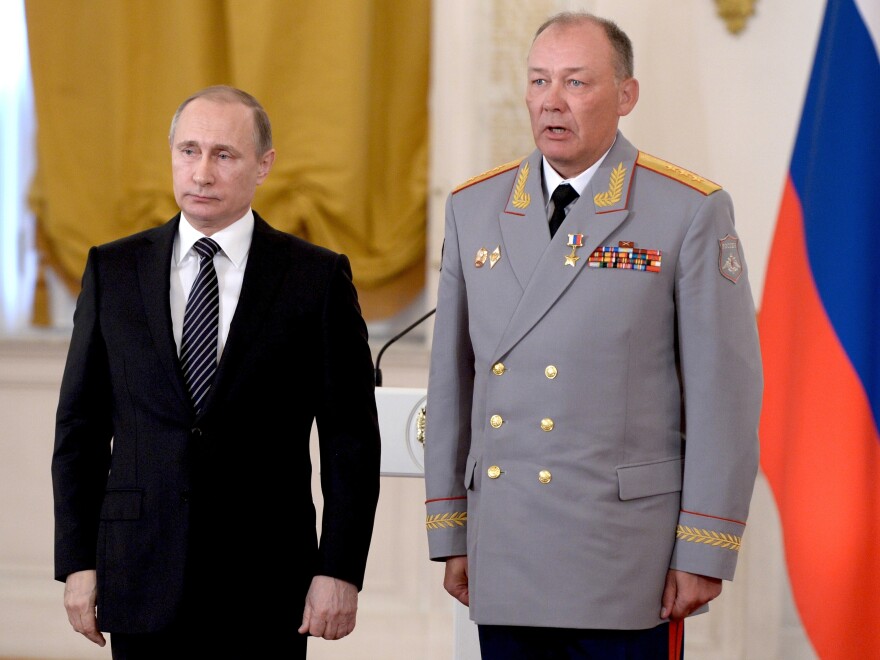Last Sunday, U.S. officials confirmed that General Aleksandr Dvornikov had been appointed to lead Russia's invasion of Ukraine, in a grim omen that it may pursue even more ruthless tactics in the ongoing war.
Dvornikov has been called "the butcher of Syria," having led a brutal campaign in Syria's civil war in 2015.
Some of the most devastating attacks on Ukraine have happened under his watch, including in the southern city of Mariupol, which has been all but obliterated, and the missile strike on a train station that killed at least 50 people.
In an interview on All Things Considered, Elizabeth Tsurkov, a fellow at the New Lines Institute for Strategy and Foreign Policy, broke down Dvornikov's past experience as a military commander and what his new position could mean for the next phase of the war.
This interview has been edited for length and clarity.
Interview Highlights
On who Dvornikov is and what he has done
Russia does not release information about the personality or special characteristics of the person, but we can judge him by his actions.
Dvornikov oversaw the start of the Russian intervention in the war in Syria from September 2015 until July 2016, when he was replaced by another general.
And looking at his record during that time, he oversaw a campaign that combined a great deal of disinformation and lies — presenting the fighting that is happening in Syria as one that is targeting terrorism and ISIS, even though he did not target ISIS.
On Dvornikov's reputation for being ruthless
The Russians ended up destroying eastern Aleppo to retake it from the rebels. This entailed use of unguided bombs that hit indiscriminately, as well as cluster munition, as well as thermobaric weapons.
These [thermobaric weapons] are weapons that are often mislabeled, including in the conflict right now in Ukraine, as white phosphorus.

[Ukrainians are] instead being hit by thermite, which is significantly hotter than white phosphorus. Thermite is used to melt metal, so you can only imagine what happens to the human body when it is hit with thermite.
And we are also seeing in Ukraine strikes on hospitals, on bakeries. These are all tactics that were used extensively under Dvornikov in Syria.
On whether Dvornikov faces a tougher fight in Ukraine
The conflict in Syria is matched by its brutality, to some extent, with the Ukrainian one, unfortunately.
But in other aspects, it is quite different. In Ukraine, the Russians are forced to fight a proper military that is well supplied and well organized, as opposed to disparate rebel groups that are not united, or are poorly supplied.
But when faced with a proper military, we're basically seeing really kind of embarrassing defeats that now apparently Dvornikov is supposed to prevent from recurring.
On what we should expect from his tenure
The conflict is likely to get bloodier, not because Dvornikov has been put in charge, per se, but because the Russians are unable to achieve the victory that they expected to achieve very quickly.
So now unable to achieve those military goals, they are basically returning to their kind of default mode, which is massive use of indiscriminate fire. When Dvornikov took over the command of Russian forces in Syria, [he basically destroyed] the city and led to mass displacement that has not been addressed. People remain displaced from their homes till this day.
Hopefully in the case of Ukraine, when this war ends and people will be able to return to their homes, countries will provide resources to allow people to return and not perpetuate basically a situation of permanent displacement and exile that Syrians continue to suffer through.
Copyright 2022 NPR. To see more, visit https://www.npr.org.





